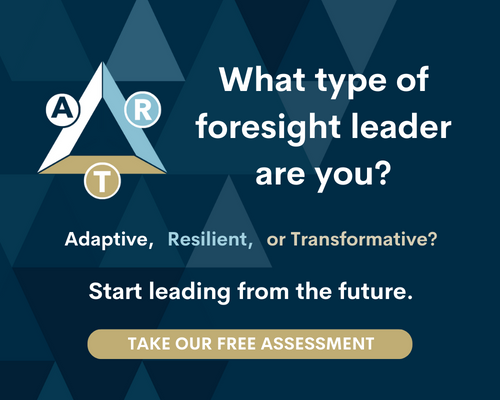It’s Time to Democratize the Future

Originally appeared on Medium by Frank Spencer on February 10, 2018
In a recent article published in Fast Company magazine entitled “What Faux Futurists Cost The Rest Of Us,” author Liz Alexander asks a vital and timely question of all businesses and governments: “What problem are you solving?” The question is so important because of the big world problems that each and every one of us must address such as climate change, economic inequality and population displacement. However, it’s also a question for the hoard of tech-crazed unicorn chasers who are creating the next wave of supposedly indispensable gadgets. Are they solving problems, or creating solutions where no problems exist? The definition of success in the land of technotopia certainly feels a little less human every day.
By now, you’ve heard this sentiment echoed hundreds of times from social entrepreneurs, wary journalists and internet activists. Thought leaders from all walks of life are wondering if we are building a future that no one wants, no one likes, and no one can afford to embrace. To that end, it’s imperative that we take immediate steps on both a local and global level to democratize the future. This task may seem overwhelming, but at least the concept is simple: we need business leaders, politicians, technologists, and scientists who will “Start by asking ordinary people what they want tomorrow to look like, then work backward from there.”
It’s easy to say that we need to democratize the future — that we must be solving for real problems that everyday people are experiencing, and that we need to listen to what those everyday people really want the future to look like. There’s only one problem — that’s not how democratizing the future works.
As sci-fi author William Gibson wrote, “The future is already here, it just isn’t evenly distributed.” You can’t say the “real” future is found among “everyday people” who are experiencing the breakdown of antiquated industries and the collapse of outmoded systems anymore than you can say that the future is only found in Silicon Valley. Whether or not Henry Ford actually said, “If I had asked people what they wanted, they would have said faster horses,” the sentiment still rings true. The people hoping that coal-mining jobs or manufacturing jobs or gas-guzzling muscle cars will stick around forever generally aren’t going to be the ones who will have the capacity to drive humanity forward into the necessary evolutionary development of transformational economies, ecologies of conservation, transportation and city redesign that promote widespread human development, governmental reframing, and more. Asking individuals who have been “left behind” by the development of green energy, artificial intelligence, robotics, blockchain platforms, networked matter, or social value shifts will most likely result in stories about the “good old days” and a cry to “make the past great again.”
A general rule of thumb is that the future is agnostic. It really doesn’t care if you like it or not. It emerges, it unfolds, and it transforms. We’ve all seen the articles over the past year stating that people voted for Brexit and Trump to get rid of establishment politics and shake things up. That’s only partially true at best. The votes to disrupt the system in places such as Britain, Poland, and the U.S. were votes to restore a “glorified past” and visions of a “retro future” in an attempt to thwart the massive change taking place that’s terrifying them and leaving them behind. Truth be told, nobody really loves change. We like what we’ve always known. But the agnostic future makes our attitude toward change largely irrelevant. What we should really be talking about is the mind-numbingly terrible job that leaders, social innovators and technologists have done of distributing the post-normal shift that is redefining life, work, communication, and humanity-at-large. Nonetheless, the disparity caused by institutional greed or indifference doesn’t delegitimize the shift itself. It just means we’ve tried to transition to a new era while reinforcing an old mindset. The future could definitely reflect a rejection of knowledge, discovery and human advancement — but that will also mean that we failed to truly democratize the future.
Another rule of thumb is that the future moves faster than we might expect, especially in today’s landscape of exponentially increasing complexity. The Kondratiev and Gartner cycles that were used to forecast economies and predict technological hype don’t work nearly as well as they did in a previous era, and the “laws” of complexity and exponential emergence don’t fit nicely into those Industrial Age models. That’s why outdated systems of legislation, government and policy can’t match the speed of blockchain, the Internet of Things, AI, or the expanding web, as well as the social shifts that proceed or stem from these developments. Take autonomous vehicles as an example. This technological advancement is vital in terms of mass transportation, traffic deaths, insurance policies, city design and development, climate conservation, etc., and its adoption is happening at a much faster rate than most predicted. However, many see this as an unwanted, disliked, or useless technology — useless in the eyes of those who don’t think about these big world issues on a daily basis. While we are working hard to make sure we don’t get sucked into “sensationalism,” we also have to be aware of our own “educated incapacity” or “illusion of certainty” that misses the power of provocative foresight to push us toward preferred outcomes and action — or simply leaves us in the dust while we are fixated on the “slow-moving future” of our industry or insulated life.
In our attempt to democratize the future by asking ordinary people what they want the future to look like, we do a great disservice to all of humanity. We must instead see that the rise of isolationism and extreme nationalism is a sign that individuals are trying to fight the future, either because they don’t like change or because they were economically and socially disenfranchised by those who are embracing the transition to to a new era in human history. To say that the future should unfold in accordance with the viewpoint of the masses is to play into the hands of bias, fear and the reinforcement of broken ideologies. This certainly doesn’t mean that technocrats have all the answers, but it also doesn’t mean that those who are feeling the negative impact of bad governance and mismanaged social development during a time of naturally-dying industries, disciplines and systems have the answer either.
If we want to democratize the future, we have to do more than listen. We have to empower. This means that we have to intentionally and actively distribute the future faster, especially in areas where the destruction of old systems and industries have devastated the population. We need to get the emerging future into the hands of those who are afraid of it or have been disenfranchised because of it. We need to put a high priority on not only learning, but unlearning and relearning as well. We need to give people the tools to understand and create the future for themselves and their communities. And we need to define the future as much more than technological change, teaching the next generation the skills of sense-making, meshing, adaption, resilience and transformation.
Democratizing the future is about much more than thinking about or discussing the changes on the horizon — that often only serves to scare and entrench people. It’s time that we give everyone the ability to create, act upon, and be a part of the emerging future — so that no one is left behind.

Frank Spencer
Co-Founder
Creative Director
In 2009, Frank founded Kedge – a global foresight, innovation, and strategic design firm which pioneered TFSX. Throughout his career, Frank has worked as a leadership coach and developer with entrepreneurs, social communities, networking initiatives, and SMEs, helping them in areas such as development, innovation, and networking.
Read More
